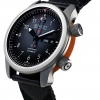Baskets for Ultrasonic Cleaner
-
Recently Browsing
- No registered users viewing this page.
-
Topics
-
Posts
-
A local machinery auction this week is liquidating some watchmaker's equipment. Actually a truly absurd amount of it, from a machine collector's estate, making me wish I had waited a couple of months to buy my lathe because there are so many options at low prices. Anyway - there are a handful of faceplates on 8mm collet mounts up for sale and I think I can probably get one. Having never had one in hand, they seem kind of large as described though - all are listed at either 4in (101mm) or 3 11/16in (93.7mm) diameter. As I understand it, WW lathes are 50mm from spindle center to bed so it seems like the 4 inch faceplates would not have enough clearance. Could I expect the 3 11/16in to fit with a WW headstock and bed? What is a typical diameter for a faceplate? Also possible the description of "4 inches" is only a rough estimate by the auction house and not actually accurate. Example the 3 11/16":
-
Buying a specific jewel for a specific movement is difficult if not impossible in most cases. cousinsuk/jewels
-
your best approach is to measure the current crystal and find a replacement at an online watch parts supply.
-
The jewels in the barrel train bridge appear to be set or rubbed in so your best option would be a new bridge. The balance jewel looks fine to me.




Recommended Posts
Join the conversation
You can post now and register later. If you have an account, sign in now to post with your account.
Note: Your post will require moderator approval before it will be visible.